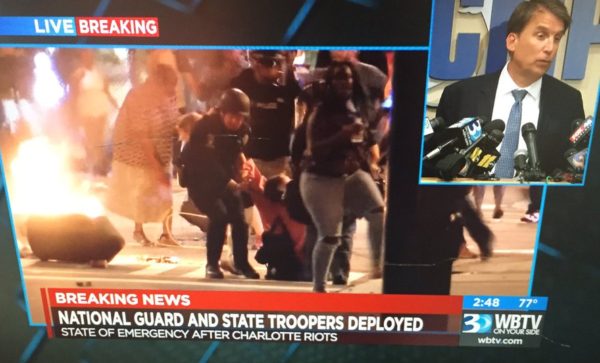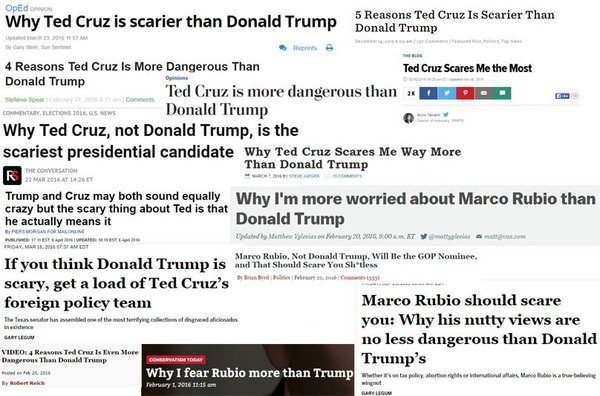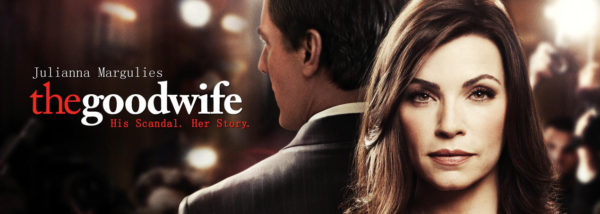Blog Archives
Ted Cruz: I guess endorsing Trump is my only shot at becoming president
Ted Cruz's Dad: If you ever get a shot at the president, you take it— Comfortably Smug (@ComfortablySmug) September 23, 2016

In response to a video of kinetic protesters ganging up on a car, Glenn “Instapundit” Reynolds tweeted the following to the right. Needless to say, it stirred up some controversy and backlash. Some went so far as to call his tweet an appeal for “mass murder”, though others stuck with terminology “vehicular assault.”
It didn’t take long for Twitter to act, and Reynolds’s account was suspended. What followed after that was reasonably predictable, with various critics and defenders, mostly along predictable lines. Reynolds defended himself thusly:
Sorry, blocking the interstate is dangerous, and trapping people in their cars and surrounding them is a threat. Driving on is self-preservation, especially when we’ve had mobs destroying property and injuring and killing people. But if Twitter doesn’t like me, I’m happy to stop providing them with free content.ANOTHER UPDATE: Was just on Hugh Hewitt talking about this. Since Twitter won’t let me respond to — or even see — my critics, let me expand here.I’ve always been a supporter of free speech and peaceful protest. I fully support people protesting police actions, and I’ve been writing in support of greater accountability for police for years.But riots aren’t peaceful protest. And blocking interstates and trapping people in their cars is not peaceful protest — it’s threatening and dangerous, especially against the background of people rioting, cops being injured, civilian-on-civilian shootings, and so on. I wouldn’t actually aim for people blocking the road, but I wouldn’t stop because I’d fear for my safety, as I think any reasonable person would.“Run them down” perhaps didn’t capture this fully, but it’s Twitter, where character limits stand in the way of nuance.
I think some of the frustration with Twitter on the part of many of Reynolds’s defenders is rather legitimate. In some cases, I disagree but think they are touching on something about the dynamics of politics, celebrity, and Twitter. Where they take action and where they don’t. Flagging Reynolds does seem (at best) random compared to a lot of trangessions that are let slid.
But seriously, this is not the hill to die on. If Reynolds had wanted to tweet about getting away, he could have done so. He didn’t. There are two reasons that a driver in such a terrible situation might run somebody over: To get away, or to inflict injury. If you’re advocating action that could result in both of those things, you need to be very clear about which of those things is your goal. Reynolds, intentionally or not, went for the unacceptable one.
Had the drivers hurt someone in the process of getting out, I honestly wouldn’t have been too bothered. If there was a recorded phone call prior to that saying he was going to “Run these assholes over!” with a note of enthusiasm, then that might be a different story. Maybe. Those kinetic protesters did put themselves in harms way, but that’s not a blank check to do whatever. Put those words in a recording, and an obvious attempt to plow through people rather than simply get out, then the driver has some explaining to do. I might be loathe to want to prosecute, but at the very least such actions should not be applauded or encouraged.
That doesn’t mean that he needed to be permanently banned, and he wasn’t. He just had to delete the tweet and everything was restored. There appear to be some glitches in the process, but by and large this all seems within parameters both for Twitter and Reynolds. Reynolds said something he shouldn’t have, which happens. Twitter took action, but nothing earth-shattering, and life goes on. At least it should.
Ecigarette maker NJOY is calling it quits:
The company filed for bankruptcy protection on Sept. 16 in Delaware federal court, burning some high-powered Silicon Valley investors, including Sean Parker, co-founder of the now-defunct Napster, and PayPal founder Peter Thiel, who were part of a $70 million capital round that valued NJOY at $1 billion in 2013. Singer Bruno Mars is also an investor in NJOY and a fan of the e-cigarettes, which heat nicotine-laced liquid into vapor.
Parker, who ponied up $10 million to put into the company, said at the time that electronic cigarettes had the potential to make regular cigarettes “and all the harm they cause obsolete.”
The filing comes just five months after new federal regulations from Food and Drug Administration threaten the fast-growing multibillion-dollar industry that includes tobacco giants Altria and Reynolds, which own MarkTen and Vuse, respectively.

Photo by lindsay-fox 
That being said, as a first order of effect it’s hard to blame NJOY’s fall on the FDA’s Deeming regulations. Their sales fell to a tenth of their high mark in an industry that’s growing. They failed because they had a shoddy product. Where the FDA comes in is that it turned off the light at the end of the tunnel. Without the FDA regulations, they might have been able to pivot into different products, change their focus, or any number of other things. Instead, they are going to be required to spend millions of dollars just to keep their current lackluster product on the market. And unlike Big Tobacco, they just don’t have the resources to do so.
When I talk about their product, I should clarify. Though they sell different things, NJOY focused primarily on cigalikes and closed systems. They’re not bad products exactly. I quit smoking with Blu, which was a similar product. Others, though, have found their product not remotely satisfactory as a cigarette replacement and I myself would have had a much smoother transition if I’d gone straight to vape pens or some other more efficient device. Blu is still around, though they have gone from being front-and-center at the cigarette counter to something you see down at the bottom right tucked out of the way. There may be a market for items that give a poor vape but retain the look and feel of cigarettes, but it’s likely pretty limited, and NJOY’s model seemed built around it.
Some public health advocates seem to be celebrating this development, while some pro-vape people say it portends bad things. I believe it’s mostly irrelevant. I’m not worried about NJOY. I’m worried about vape shops, independent dealers, and the like. The main thing I will miss about NJOY is that they had a good media presence and were one of the better known brands that had never been associated with tobacco companies. They were an easy company to cite when someone said that the whole thing is a front for Big Tobacco.
Tyler Cowen looks at possible reasons Trump won, if he wins. I remain confident that Trump is not going to win, but whether he does or not that he remains where he is means that some people are going to have to figure things out. Most particularly Republicans. Individual Republicans seeking to capitalize on his success, if not the party looking to prevent it. Maybe some of both. But how much of it is his grab-bag of policy? How much of it is his celebrity? How much of it is his abrasive posture? A lot hinges on the answers, which nobody presently knows.
Outside a Trump victory, one of the worst things that can happen in my view is a 3-5% victory for Hillary Clinton. Depending on what the exits say, close enough that the argument for a non-offensive candidate becomes harder to make, and far enough of a margin for the Democrats to believe that Demographics Uber Alles and they never need worry about losing again so there is no cause for alarm.
This election is like if your friends pick dinner and 3 vote pizza and 2 vote "kill and eat you". Even if pizza wins, there's a big problem.
— Andrew Shvarts (@Shvartacus) August 9, 2016
{Via Jaybird}
I know that I often talk about (and complain about) the liberal skew of Hollywood productions. Which I think is fair, but I should also point out when they do something I would like to see more of. I had an email exchange recently about politics and entertainment which reminded me of a post I’d long wanted to write about The Good Wife. This post assumes that you have not watched the show, and don’t care to, and will have some relatively inconsequential (or predictable) spoilers.
The basic premise behind The Good Wife is Alicia Florek as a protagonists whose husband is caught in a sexy political scandal, forcing her to transition from a Stay-At-Home-Mother back into the workplace, in this case a law firm. For the most part, though, it’s a political and legal drama with Alicia at the center of it, both in court and with her husband on the political stage.
The show takes place in Chicago, which means that almost all of its politics are going to be skewed to the left. Along these lines, it would have been easy and inconspicuous for conservatives to be notably absent and their view either unrepresented or poorly represented and liberal perspectives to be embedded in the show across the board. For the most part, this is how the show ran for the first few seasons. Though even early on, there were exceptions and indications that they weren’t going to stick with that formula.
The show had (basically) three elections over its run, with almost all of the participants being Democrats because Chicago. In all but one race[1], the Floreks found themselves up against somebody running to their left. This served to moderate the Floreks, comparatively speaking, as they pursued white and/or centrist voters[2]. This lead to a decent plot thread wherein a member of the Florek family figured out that they were targeting the white vote specifically against his black opponent. But it introduced a degree of ambiguity that served the show well.
Sometimes shows with politics to go out of their way to make all of the bad guys Republicans[3]. They managed to avoid that by recognizing that when they needed an unexpected racist that it might be better to make him a progressive liberal that everybody in the office looked up to. Little things like that matter, especially given “Family Values Republican actually a sexual deviant” is more a cliche than a twist, at this point.
They also introduced Kurt McVeigh (no relation), a reasonably well-developed rightwing character. He was introduced as a ballistics expert, but became the romantic interest to Diane, the most liberal character on the show. Setting aside political preferences and such, it interwove liberal and conservative characters in a way that I would really like to see more of. It’s not just about having different perspectives represented, but it makes for more entertaining television when everybody in the room doesn’t share the same basic orientation.
Where the show really hit its stride in this regard was in the later seasons, when I think they were running out of ideas to keep the show going. Among other things, they brought in Oliver Platt as a conservative character who hired the firm and used Diane to bounce ideas off of. This lead to a great episode where they talked about RFRA and gay wedding cakes. Platt and company talked about the prospects of a cake baker, and eventually isolated a wedding planner as the best case to find and bring suit. Diane, who fell squarely on the side of gay couples, got the last word. But nonetheless it was well done. And from there, Diane went on to help one of Platt’s intermediaries with a PP Video case that she viewed as a First Amendment issue, much to the chagrin of everybody else at the firm.
Though the above may give a faulty impression, The Good Wife falls squarely to the left, on the whole. But impressive-to-me, they never let that get in the way of telling a good or interesting story. I have multiple motivations for getting on my soapbox on the subject, but the most basic reason I want to see more variety is simply because it can make better stories that way. The legal aspects of The Practice were better than Boston Legal simply by having Helen Gamble (Laura Flynn Boyle) on the show[4]. This doesn’t just apply to legal and political dramas (for those in particular, a skew usually makes narrative sense and there is only one skew they can pull off), but more or less anything where politics is likely to come up.
[1] The exception was the Illinois Governor’s race, wherein Peter was running against Maura Tierney, who was running to his left, and then a general election against Matthew Perry, who played an ideologically nondescript Republican.
[2] Everything in this post is a simplification. They actually spent more time pursuing the black vote, with Peter forming a bond with a black preacher, and so on. But there were two plot threads wherein the Floreks pursued voters that at least some participants were uncomfortable with. Peter’s dogwhistling and later Alicia’s run against a rumored-to-be-gay David Hyde Pierce.
[3] One example, The Event, had a protagonist president and an antagonist vice president, so what were they to do? Why, they decided to make it a unity ticket. That way, the president could be a intimated Democrat and the vice president a Republican. Presto!
[4] Boston Legal did have a couple of conservative characters, but more as foils than anything. Denny Crane was crazy, and Brad Chase was ineffectual. It was – until the end, anyway – better than nothing, but it was what it was.
Man, babies make living life look great. Thanks for that, babies. pic.twitter.com/F9TfJW5QmK
— Cheerios (@cheerios) September 17, 2016
tfw Cheerios comes out as explicitly pro-natalist https://t.co/iaThA2FiVU
— Tamara (@BookOfTamara) September 18, 2016
So hey, about sex and politics. Liberals tend to be both more ambitious and less satisfied with their sex lives than conservatives. Which makes sense, when you think about it. It’s my belief that a lot of the world’s problems can be solved with lowered expectations. Along those lines, does anyone remember this from MADtv?




